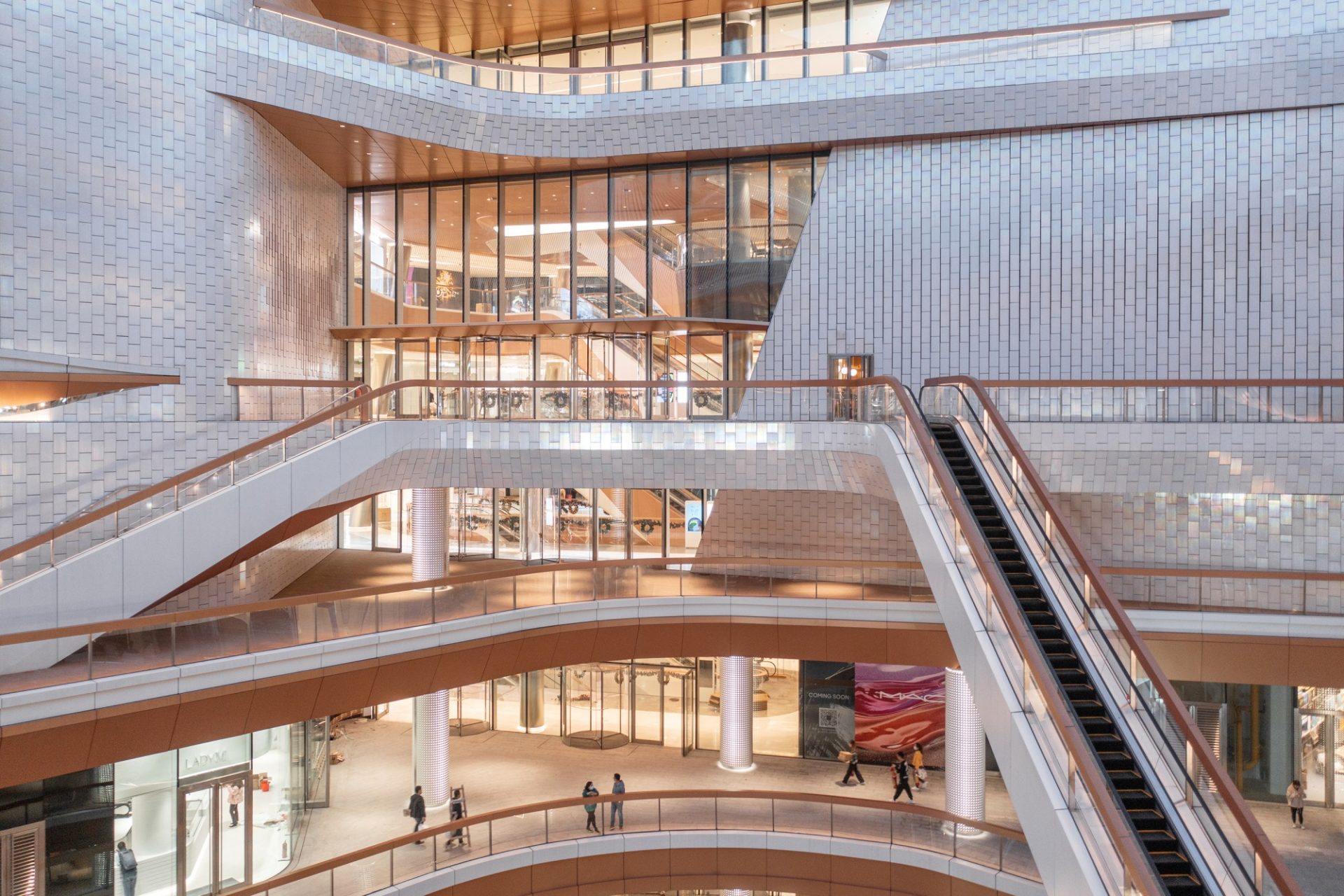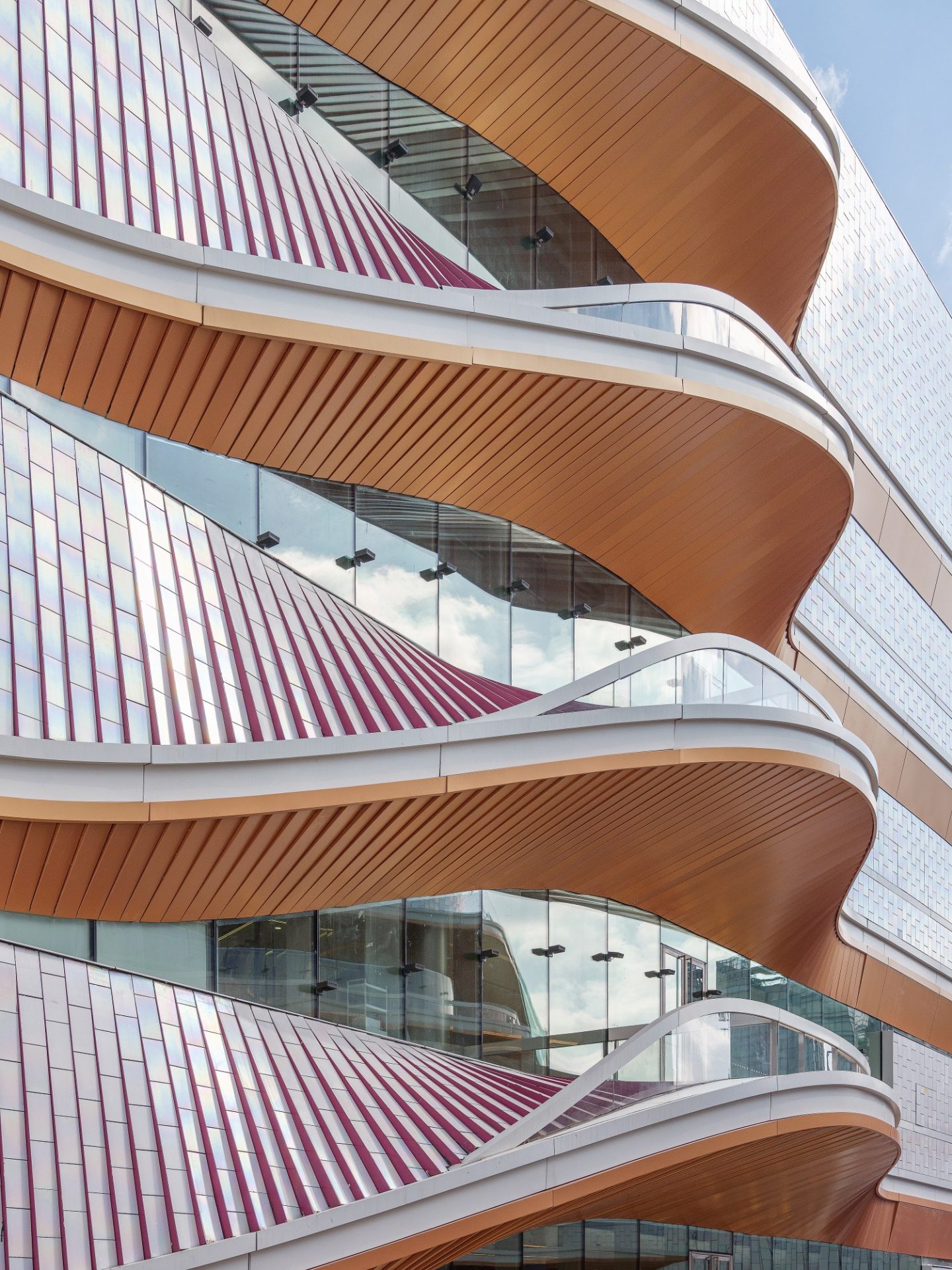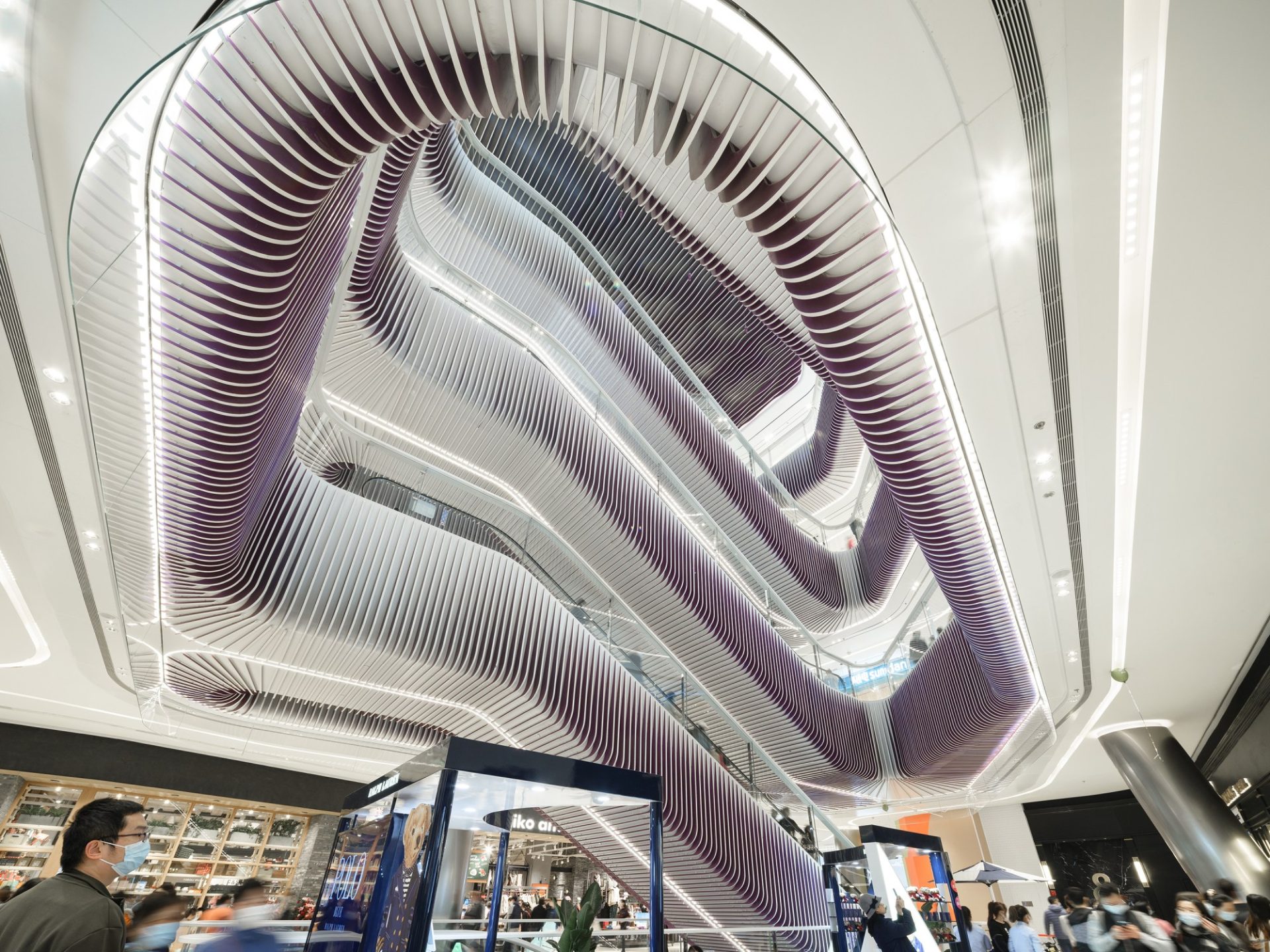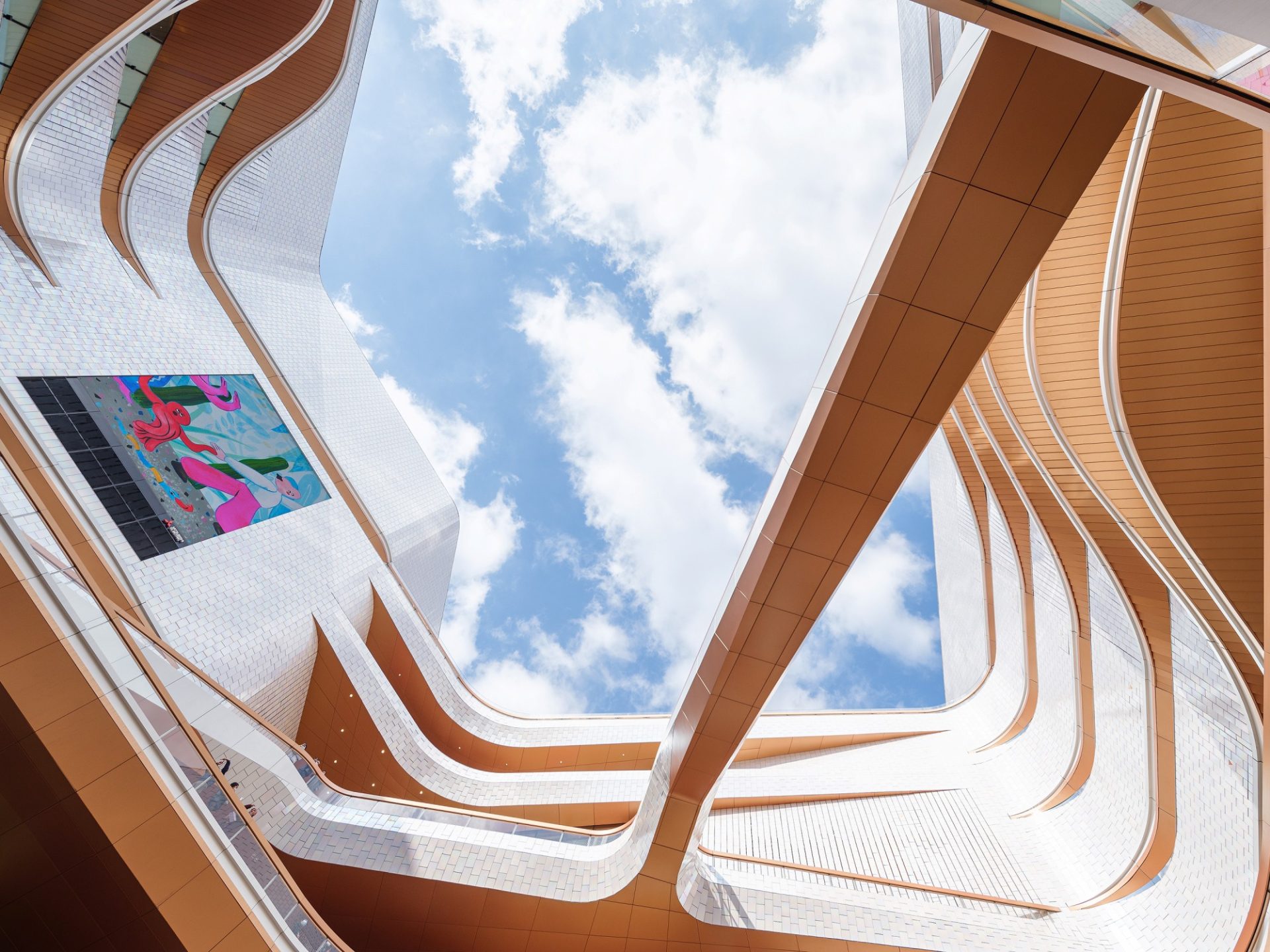UNStudio creates Destination Public Spaces within a Mall
UNStudio, in collaboration with Nihon Sekkei, recently completed the Shanghai Jiuguang Center. The design for this brand-new retail destination, which sits in the middle of a bustling Shanghai neighbourhood merges an advanced commercial ecosystem with a human-centric, customer-friendly destination.

“Shopping malls are the public spaces of Chinese cities. These retail complexes are not simply places to shop, they are all-in-one destinations for outings and social gatherings. They are also places where culture and commerce merge and where architecture can express this expansive condition,” says Ben van Berkel.
Collaboration was key for the creation of a symbiotic relationship between the commercial aspirations and the architectural interventions. While Nihon Sekkei was asked to develop the outer shell of the retail center, UNStudio was tasked with fleshing out the mall as a placemaking destination for customers and the larger community. This included the design of the inner courtyard and its facades, the full interior of the mall, and a public rooftop terrace.
User experience has been the core of UNStudio’s design with its success in designing the Qatar Rail stations. Looking at the numerous ways users could engage with the various spaces and creating curated shopping experiences for different users informed the design of the building. This resulted in creating a synergy between the architectural and interior design, the building scale and the human scale, the geometry, and materials, and the inside-outside relationship.
The design includes a central courtyard and landscape area that sits at the heart of the mall. This courtyard not only serves as an event space for the mall itself but also provides a destination for the wider community. An integral element of the central courtyard is the sunken area with integrated seating, planting, and lighting that is also designed to be used for events. As such the courtyard becomes a destination both during the day and in the evenings.

An integral element of the central courtyard is the sunken area with integrated seating, planting, and lighting that is also designed to be used for events.
The courtyard landscape links the basement levels and the upper levels by way of a generous staircase and escalators. In addition to providing direct access to the ground floor, the articulation and horizontal window bands in the facades surrounding the courtyard create a strong visual connection between the external space and the interior public areas on all levels.
The courtyard facade was conceived as a pearl set within its shell, referring to the tessellated enclosure of the exterior facade, which opens up to a fluid experience and a mother-of-pearl effect as you enter the central courtyard.
 The various balconies that are connected to the void spaces blur the relationship between interior and exterior, while the pearlescent material finish of the ceramic tiles emphasises the daylight falling on different areas of the facade and creating dynamic reflections throughout the day. The surrounding façade also expresses the interior design and identity, with the balcony detail also featuring colour that is matched with the colours predominantly used to accentuate three interior voids.
The various balconies that are connected to the void spaces blur the relationship between interior and exterior, while the pearlescent material finish of the ceramic tiles emphasises the daylight falling on different areas of the facade and creating dynamic reflections throughout the day. The surrounding façade also expresses the interior design and identity, with the balcony detail also featuring colour that is matched with the colours predominantly used to accentuate three interior voids.
The strong relationship between the exterior and interior continues in the organisation of three internal voids which are located on the perimeter of the courtyard. Long bands of windows along the courtyard enable glimpses to the interior spaces, while light enters the void spaces through the facade, creating vertical spaces flooded with daylight.
Each void has its own distinct identity and materialisation, based on three different themes that vertically link the shopping experience and help to orientate users within the expansive retail areas.
The ‘urban playground’ themed void, with its bright a colorful material scheme, expresses the bustle of the city outside. For the second void, with the theme ‘urban oasis’, the materialisation sets out to re-connect with nature, using warm colour tones and brass articulations throughout. The third void, which is themed as an ‘urban catwalk’, describes a nighttime atmosphere that is reflected in the dark, glossy materials used.
 The three voids anchor the public circulation areas and create a vertical space across the different retail levels. They further supply the circulation spaces with daylight, while providing glimpses to the courtyard outside.
The three voids anchor the public circulation areas and create a vertical space across the different retail levels. They further supply the circulation spaces with daylight, while providing glimpses to the courtyard outside.
The main vertical circulation is located alongside these voids, while the voids themselves are connected on each floor by a retail boulevard: a continuous route that provides access to all shops. On every floor, this internal boulevard is curated into three zones with a series of attraction points.
The ceiling design integrates a pattern that acts as a wayfinding element, pointing to common areas such as restrooms, elevators, and the escalators located next to the voids.
The retail boulevard, along with the three themed voids, forms an interior public space that creates a constant flow of people, which adds to the overall orientation and curated experience of the building.
PROJECT DETAILS:
UNStudio team credits:
Ben van Berkel, Astrid Piber, Hannes Pfau with Ger Gijzen, Marc Salemink, Sontaya Bluangtook and Daniele de Benedictis, Dongbo Han, Enrique Lopez, Lars van Hoften, Tiia Vahula, Martin Zangerl, Mo Lai, Ningzhu Wang, Shuang Zhang, Marta Piaseczynska, Chao Liu, Cristina Bolis, Tom Wong, Yang Li
Advisors
Local Architect: TJAD
Façade Consultant: Schmidlin
Lighting Design: Bartenbach
Client: Lifestyle China Group Limited
Photography: ©Aaron&Rex






